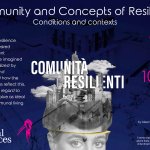
Community and Concepts of Resilience : Conditions and contexts
Our workshop seeks to illuminate aspects of resilience which are not usually addressed in the prevailing discourse but would help us better understand this phenomenon. These include its relation to utopia, the effects of ‘negative’, system-induced resilience, the relationship between resilience and sustainability, as well as the spatial and aesthetic expressions of resilient communities. We will examine these aspects in relation to one another, as well as in relation to the topics addressed in typical discussions about resilience, such as the impact of climate change, associated ecological consequences, and technological aspects relating to the development of ‘resilient’ communities.
We aim to open up new perspectives on the multi-faceted phenomenon of resilience, offering a holistic, multidimensional view of this topic. For resilience is not only about the practical domain of climate change, ecology and technology, but also about an ‘ideal’ domain: the ideas, basic assumptions and associated mindsets we have about resilience, which feed into the practical designs of systems built for ‘resilient’ communities.
Resilience is defined in broad terms as the capacity to persist, adapt or transform in the face of change, in a way that maintains the basic identity of a system. We will explore the relationship between practical and ‘ideal’ domains of resilience, and how these domains influence one another
Topics
In practical terms, resilience refers to how communities and the spaces in which they live maintain their identities against pressures brought about by disruptive forces, which fundamentally alter cultural, social and economical structures, e.g. climate change and its ecological repercussions.
There is another, often neglected aspect of ‘practical’ resilience: the momentum and impact of existing systems. This is called ‘negative’ or systemic resilience, and is largely made up of socioeconomic forces of the existing neoliberal economic system. Systemic resilience often counteracts the ‘positive’ resilience towards which communities strive. These socioeconomic factors, and their intersection with technology and social inequality, are of great importance (Khalid Kadir, UC Berkeley). We will look at a case study, the communities in the New Orleans region (Greg Delaune, Deep Blue Institute/Seasteading), to explore systemic resilience, as well as ways of overcoming it ecologically, socioeconomically and culturally.
In ‘ideal’ terms, resilience refers to how desired spaces for ‘resilient’ communities are imagined and conceptualized by their planners and inhabitants, and how the designed spaces reflect this, particularly with regard to their symbolic value as ideal spaces for communal living. This is the ‘ideal’ domain of resilience, consisting of predominant ideas that form our basic assumptions about resilience. Many of these key ideas are rooted in our cultural heritage and are reflected in the respective ‘practical’ constructions, which are the symbolic expressions of those ideas. In turn, the emergence of ideas and concepts is triggered by practical circumstances.
The topic of ‘resilience’ is intrinsically related to people’s mindsets. Discussions about resilience focus on the human imagination and concepts that will enable us to achieve a desired resilience, as well as how this can be reached by technology. It reflects a mindset of domination, similar to the mindset that led to recent ecological and socioeconomic crises and culminated in climate change. It is echoed in the prevailing topic of “resilient” communities. No matter how resilient, networked or smart a city is, social and commercial functions are still dis-integrated and segregated, and the more we try to impose planned structures on our cities, the more we seem to alienate the ‘heart’ of the city: its inhabitants.
We will elaborate on this prevailing technological mindset, with a particular focus on architecture (John Marx, Burning Man/Vice Chair of the SF Art Institute), as well as issues including domination, overall formatting and technique. Taking a case study from India as an example, (Jateen Lad, Univ. of Manchester/Auroville), we will show how bottom up-approaches can be used to build resilient communities from scratch.
Several key ideas about resilience are embedded in our cultural history, such as the inherent connection between resilience and utopia: achieving a ‘positive’ resilience is an essentially utopian venture. It is rooted in conceptions deeply embedded in our cultural heritage, which refer to how we imagine ideal communities and our assumptions about a generalized conditio humana. These mindsets are reflected in the respective ‘ideal’ spaces designed for such communities and will be examined together with the spaces they generate as their symbolic representatives.
Finally, we are also interested in exploring the shift from sustainability to resilience, and the relationships between these concepts. Why was the prevailing idea of sustainability replaced with one of resilience? Which ecological, technological, economic and sociocultural circumstances triggered this shift? Does resilience lead to increased sustainability, or is sustainability a premise for becoming resilient?
This workshop aims to stimulate a broader discussion about how resilience can function from an interdisciplinary perspective, and how the foundations of a resilient environment can be established in practical terms, by spatial designers, planners, architects; and last but not least by the inhabitants of such environments.
